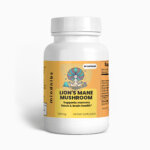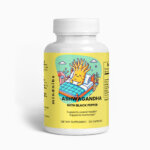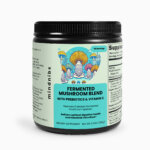
Top 10 Benefits of Adding Probiotics to Your Skin Care Routine
Have you ever struggled with redness, breakouts, or that tight, dry feeling after cleansing, you might be overlooking a key player in skin health: your microbiome. Enter probiotics, the unsung heroes of modern skincare. These beneficial bacteria are transforming how we care for our skin, offering a natural, science-backed way to restore balance and glow. In this guide, we’ll explore the top 10 benefits of adding probiotics to your skin care routine, why they’re a game-changer for sensitive or acne-prone skin, and how to seamlessly integrate them into your daily regimen.
Probiotics aren’t just for gut health anymore. From strengthening your skin’s barrier to reducing inflammation, probiotic skincare taps into the power of your skin’s microbiome to deliver real results. Whether you’re a natural beauty fan or someone desperate to calm irritated skin, this article will show you why probiotics deserve a spot in your routine—and how to make them work for you.
Introduction to Probiotics and Skin Care
Imagine your skin as a bustling city, home to trillions of microorganisms working together to keep things running smoothly. This community, known as the skin microbiome, is your first line of defense against environmental stressors, harmful bacteria, and premature aging. But modern life—think overcleansing, harsh chemicals, and pollution—can throw this delicate ecosystem out of whack, leading to issues like acne, redness, or sensitivity.
That’s where probiotics come in. Originally celebrated for gut health, probiotics are live beneficial bacteria that, when applied topically, help restore balance to your skin’s microbiome. The rise of probiotic skincare reflects a growing awareness that healthy skin starts with a thriving microbial community. Brands like Sanitify are leading the charge with products like their Pre- and Probiotic Concentrate, designed to nourish your skin naturally.
Why now? Our obsession with squeaky-clean skin has stripped away natural oils and beneficial bacteria, leaving our skin vulnerable. Add in stress, processed diets, and urban pollution, and it’s no wonder so many of us deal with barrier damage or chronic skin issues. Probiotics offer a gentle, effective way to rebuild what’s been lost. In the sections below, we’ll dive into the top 10 benefits of incorporating probiotics into your routine, from calming inflammation to promoting a radiant glow.
What Are Probiotics in Skincare?
So, what exactly are probiotics in the context of skincare? Unlike the yogurt you eat for gut health, topical probiotics are live or active bacteria applied directly to your skin. Common strains like Bacillus Ferment work by interacting with your skin’s microbiome to support its natural functions. They’re often found in serums, mists, or creams, like Sanitify’s probiotic skincare concentrate, which delivers a potent dose of skin-loving bacteria.
Probiotics differ from ingestible ones, which influence skin indirectly via the gut-skin axis. Topical probiotics act locally, colonizing the skin’s surface to crowd out harmful bacteria and strengthen its defenses. You’ll also hear about prebiotics (food for good bacteria) and postbiotics (byproducts of bacteria that benefit skin), which often work alongside probiotics to enhance their effects.
The science is straightforward: your skin hosts a diverse microbiome, and probiotics help maintain its balance. By introducing beneficial bacteria, products like Sanitify’s concentrate support a healthy skin barrier and combat issues caused by microbial imbalances. Think of it as planting a garden—probiotics are the seeds that help your skin flourish.
Why Is the Skin’s Microbiome So Important?
Your skin’s microbiome is like a personal bodyguard. This invisible layer of bacteria, fungi, and other microbes protects against pathogens, regulates inflammation, and helps maintain hydration. A balanced microbiome keeps your skin resilient, but modern skincare habits can disrupt it. Overusing exfoliants, retinoids, or alcohol-based cleansers strips away good bacteria, leaving your skin defenseless.
Signs of an imbalanced microbiome include persistent redness, itchiness, acne, or a dull complexion. For example, someone using a harsh foaming cleanser twice daily might notice their skin feels tight and reactive—a red flag that their microbiome needs help. Probiotics step in to restore and protect, repopulating your skin with beneficial bacteria to rebuild its natural defenses.
The concept is simple but powerful: a healthy microbiome equals healthy skin. By incorporating probiotic skincare, you’re not just treating symptoms—you’re addressing the root cause of many skin issues, setting the stage for long-term resilience.
The Top 10 Proven Benefits of Probiotic Skincare
Ready to discover why probiotics are a skincare must-have? Here are the top 10 benefits, each backed by science, anecdotes, or practical insights to show how probiotic skincare can transform your routine.
1. Strengthens the Skin Barrier
Your skin barrier, or stratum corneum, is like a brick wall that keeps moisture in and irritants out. When it’s compromised—say, from over-exfoliation or harsh weather—your skin becomes dry, sensitive, or prone to infections. Probiotics reinforce this barrier by boosting ceramide production and supporting lipid layers. A 2019 study in Experimental Dermatology found that Bacillus Ferment enhanced barrier function in subjects with compromised skin, reducing water loss by 15% over four weeks. Try adding a probiotic serum to lock in hydration and shield your skin.
2. Reduces Inflammation and Redness
If your skin flares up at the slightest trigger, probiotics can help. They calm inflammation by modulating immune responses and reducing pro-inflammatory cytokines. For example, Sarah, a 32-year-old with rosacea, noticed less redness after using a probiotic skincare mist for a month. Studies, like one in Journal of Cosmetic Dermatology (2020), show that probiotic strains reduce redness in sensitive skin by up to 20%. This makes probiotics a go-to for conditions like eczema or rosacea.
3. Balances Skin pH Naturally
Your skin’s ideal pH is slightly acidic, around 4.5–5.5, which keeps harmful bacteria at bay. Harsh cleansers or toners can disrupt this balance, leading to irritation or breakouts. Probiotics help maintain an acidic environment by producing lactic acid and other metabolites. A balanced pH means smoother, clearer skin. Users of Sanitify’s probiotic skincare concentrate often report a “calmer” complexion within weeks, thanks to this pH-regulating effect.
4. Helps Prevent Acne and Breakouts
Acne isn’t just about clogged pores—it’s often tied to an overgrowth of harmful bacteria like Cutibacterium acnes. Probiotics fight back through competitive exclusion, crowding out bad bacteria while promoting a balanced microbiome. A 2021 study in Microorganisms found that topical probiotics reduced acne lesions by 23% in 12 weeks. For acne-prone folks, adding a probiotic drop to your routine can prevent breakouts without the drying effects of benzoyl peroxide.
5. Supports Sensitive and Reactive Skin
Sensitive skin sufferers know the struggle of finding products that don’t sting or burn. Probiotics are gentle allies, soothing reactivity by strengthening the skin’s defenses and reducing sensitivity to irritants. A friend with eczema swears by a probiotic skincare cream that eased her flare-ups. Clinical trials, like one in Dermatology Research and Practice (2018), confirm that probiotics reduce sensitivity in atopic dermatitis patients, making them ideal for delicate skin.
6. Reduces Appearance of Fine Lines and Aging
Probiotics aren’t just for young skin—they’re anti-aging powerhouses. By boosting hydration and barrier function, they plump the skin and reduce the appearance of fine lines. Some strains, like Bacillus Ferment, stimulate collagen production, as shown in a 2022 Journal of Investigative Dermatology study. Users in their 40s often notice a smoother texture after incorporating probiotic skincare. It’s a natural way to age gracefully without harsh actives.
7. Fights Off Harmful Bacteria Naturally
Your skin is a battleground for good and bad bacteria. Probiotics act like tiny warriors, producing antimicrobial peptides to fend off pathogens. This natural defense mechanism helps prevent infections and breakouts. A 2020 Frontiers in Microbiology study highlighted how Bacillus strains inhibit harmful bacteria growth. Using a probiotic mist can keep your skin’s ecosystem in check, reducing the need for aggressive antibacterials.
8. Promotes Hydration and Glow
Dry, lackluster skin? Probiotics enhance hydration by supporting the skin’s ability to retain moisture. They work with your skin’s natural lipids to lock in water, giving you that coveted dewy glow. A user review of Sanitify’s probiotic skincare concentrate raved about “radiant” skin after two weeks. Studies show probiotics increase hyaluronic acid production, a key hydrator, making your skin look plump and luminous.
9. Speeds Up Skin Healing
Whether it’s a sunburn, a picked pimple, or a post-procedure irritation, probiotics accelerate healing by reducing inflammation and supporting cell turnover. A 2019 Clinical, Cosmetic and Investigational Dermatology study found that probiotic-treated skin healed 30% faster after microdermabrasion. If you’ve overdone it with retinol, a probiotic skincare serum can soothe and repair your skin faster.
10. Supports Long-Term Skin Health and Resilience
Probiotics aren’t a quick fix—they’re an investment in your skin’s future. By maintaining a balanced microbiome, they help your skin adapt to stressors like pollution or UV exposure. Long-term use of probiotic skincare builds resilience, reducing the frequency of flare-ups and sensitivity. Think of it as daily maintenance for a stronger, healthier complexion that stands the test of time.
Who Should Use Probiotic Skincare?
Probiotics are a versatile addition to most skincare routines, but they’re especially beneficial for specific groups. If you have sensitive skin, probiotics can calm reactivity and reduce stinging. Acne-prone individuals benefit from their ability to balance bacteria and prevent breakouts. Those with barrier damage—from over-exfoliation or harsh winters—will love how probiotics restore hydration and strength. Even mature skin can reap anti-aging benefits, as probiotics smooth fine lines and boost glow.
That said, probiotics aren’t for everyone. If your skin is already balanced or naturally oily, you might not need them daily. Instead, use them as a targeted treatment during stressful periods or after aggressive treatments like chemical peels. For most, though, incorporating probiotic skincare a few times a week is a safe, effective way to maintain a healthy skin routine.
How to Add Probiotics to Your Routine
Incorporating probiotics is easier than you think. Look for products like cleansers, mists, serums, or creams labeled with probiotic strains (e.g., Bacillus Ferment). Sanitify’s probiotic skincare concentrate, for example, can be mixed with your existing moisturizer or applied directly as a serum. Here’s a simple guide:
- Cleanse gently: Use a mild, microbiome-friendly cleanser to avoid stripping good bacteria.
- Apply probiotics: Use a probiotic mist or serum on damp skin to lock in moisture. A few drops of Sanitify’s concentrate work wonders.
- Moisturize: Seal everything in with a hydrating cream.
- Sunscreen: Always finish with SPF during the day.
Timing tip: Apply probiotics at night to avoid interference from daytime pollutants. Be cautious with harsh actives like AHAs or retinol, which can disrupt the microbiome. If you use these, apply them on alternate days to let probiotics do their job. Start with 2–3 times a week and adjust based on your skin’s response.
What to Expect When You Start Using Probiotics
Switching to probiotic skincare isn’t an overnight miracle, but the results are worth it. During the first 1–2 weeks, your skin might go through a transition period. This could mean mild purging (small breakouts as your microbiome rebalances) or temporary sensitivity. Don’t panic—this is normal as your skin adjusts to a new bacterial balance.
Visible results typically appear after 4–6 weeks. You might notice less redness, fewer breakouts, or a smoother texture. For example, a user with acne-prone skin reported clearer skin after a month of using Sanitify’s concentrate. Full microbiome rebalancing can take 8–12 weeks, so consistency is key. Stick with it, and your skin will thank you with a stronger natural skin barrier and a healthy glow.
The Science Behind the Claims
The buzz around probiotics isn’t just hype—it’s backed by solid science. Studies, like one in Journal of Cosmetic Dermatology (2020), show that Bacillus Ferment reduces inflammation and strengthens the skin barrier through enzymatic activity and competitive exclusion (crowding out bad bacteria). Another study in Microorganisms (2021) found that topical probiotics improve acne by balancing the skin’s microbial diversity.
Probiotics work by producing antimicrobial peptides and lactic acid, which maintain an acidic pH and fend off pathogens. They also stimulate ceramide and collagen production, supporting hydration and anti-aging. While most research is still evolving, in vitro and clinical trials consistently show that probiotic skincare enhances microbiome skincare benefits, making it a promising frontier in dermatology.
Common Questions (Mini FAQ)
Can probiotics cause breakouts?
Yes, but it’s usually temporary. During the initial rebalancing phase, some users experience purging as their microbiome adjusts. This typically subsides within 2–3 weeks.
Can you mix probiotics with actives?
Be cautious. Harsh actives like retinol or glycolic acid can disrupt the microbiome, counteracting probiotics’ benefits. Use them on alternate days or consult a dermatologist.
Do probiotics replace other skincare products?
No, they complement them. Probiotics enhance your routine but don’t replace cleansers, moisturizers, or sunscreen. Think of them as a booster for a healthy skin routine.
Is probiotic skincare safe for kids or pregnant women?
Generally, yes, as probiotics are gentle. However, pregnant women or parents should choose fragrance-free products like Sanitify’s probiotic skincare and consult a doctor for safety.
Final Thoughts + Actionable Steps
Probiotics are more than a trend—they’re a revolution in skincare. From strengthening your natural skin barrier to reducing inflammation and boosting glow, the top 10 benefits of probiotic skincare make it a must-try for anyone seeking healthier, more resilient skin. Whether you’re battling acne, sensitivity, or signs of aging, probiotics offer a gentle, natural solution that works with your skin, not against it.
Ready to start? Begin with a patch test to ensure your skin loves the new addition. Try a product like Sanitify’s Pre- and Probiotic Concentrate, which blends seamlessly into any routine. Apply it 2–3 times a week, build consistency, and watch your skin transform. Your skin doesn’t need perfection—just the right support to thrive. Take the first step toward a balanced, radiant complexion today!












